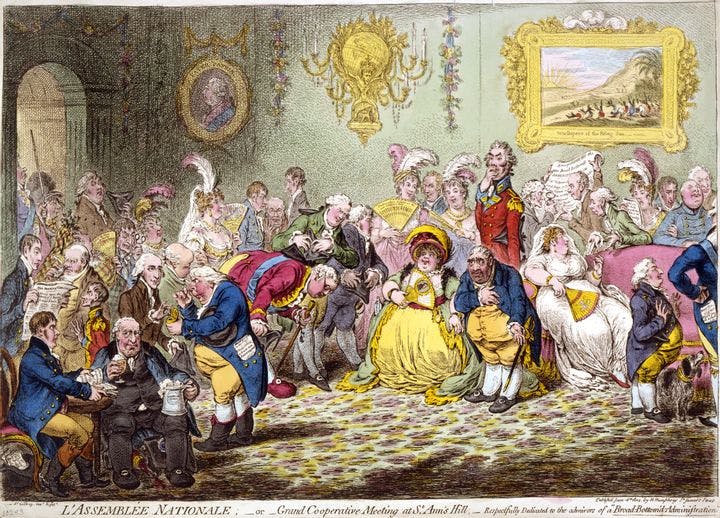Spring 2011
To Get Rich Is Glorious
– Martin Walker
The key to the Industrial Revolution was a great change in the way people spoke and thought about the merchant and the manufacturer and their values.
There are dozens of theories to explain the transformation that sparked the Industrial Revolution in Britain and, consequently, shaped the modern world. Some historians say that the traditions of British liberty, law, and private property were behind it. A religious variant of this idea is that it could never have happened without the Reformation and the Protestant ethic. Intellectual historians talk of the impact of the Enlightenment. Some economists point to the capital accumulations that resulted from the slave trade and the exploitation of India and other colonies. Scientists cite the Royal Society, Robert Boyle, and Isaac Newton (and Francis Bacon before them), who charted the way to innovation and made mechanical tinkering respectable. Financial historians tout the Bank of England’s organization of debt and credit markets. Historians of agriculture argue for improvements in farm productivity. Technologists contend that it could never have happened without the steam engine, and maritime historians say the same about the Royal Navy.
Each of these claims has merit; none are satisfactory. Yet there are few more critical questions in history. Though societies in the past—including the Roman Empire, China in the Song dynasty, and late medieval Venice—produced great wealth through innovation, none achieved Britain’s rapid and sustained economic growth, which broke through the usual Malthusian constraints (in which prosperity leads to overpopulation that can erode that prosperity).
But in 18th-century Britain, just as Robert Malthus was preparing his argument that mass starvation was looming, the Industrial Revolution gathered momentum. Real income per capita in Britain doubled in the 80 years from 1780 to 1860. That in itself was remarkable. But from 1780 to the present day, British real income per capita has increased by roughly 1,500 percent. And however spasmodic and ugly the process, the magic has spread to much of the world.
Deirdre McCloskey, a professor of economics, history, English, and communication at the University of Illinois at Chicago, ably deploys all her varied fields of expertise to offer a new and overarching explanation. The key to this revolution, she argues, was a great change in the way people spoke and thought about the merchant and the manufacturer and their values. Not only did a new respect for the bourgeoisie emerge after endless generations of aristocratic and religious and clerical disdain, but broad social acceptance made people feel free to innovate and chart their own life courses. An entire social system based on birth, landowning classes, and a stability that made privilege permanent almost overnight adopted the mantra often attributed to Deng Xiaoping: “To get rich is glorious.”
“The North Sea economy, and then the Atlantic economy, and then the world economy grew because of changing forms of speech about markets and enterprise and invention,” McCloskey argues. She goes on to examine and dismiss the claims of other scholars about the origins of the Industrial Revolution, and she is right to question them. In the 18th century, France’s foreign trade grew faster than Britain’s, and France had a bigger internal market. China, India, and the Arab world had strong and prosperous seafaring and trading traditions before Europe was launched on its so-called Age of Discovery. So why didn't these parts of the world make the breakthrough?
McCloskey’s critiques of other historians can be tedious, and her writing style is so didactic in places that it becomes irritating. But the broad thrust of her book and her erudite excitement in ideas are exhilarating. To buttress her argument, she ranges impressively from the changing social meaning of the word “honest” to post-Marxist theory and Goethe’s poetry. When Shakespeare wrote of “honest, honest Iago,” observes McCloskey, he intended to convey that the character was “honorable in an aristocratic way,” while for novelist Jane Austen, writing two centuries later, the word meant upright and “reliable in a bourgeois way, for making deals.”
All of this is greatly impressive and persuasive, but there remains a nagging question: Why did the rhetoric change, and why did the innovating bourgeois become respectable? Was it simply because he had money, and overmortgaged aristocrats saw the advantage of marrying their daughters to his wealth? Or was it that when the Glorious Revolution tamed the British monarchy, the social order became sufficiently open for the traders and inventors to surge in, just as the Bank of England (1694), Jethro Tull’s seed drill (1701), and Thomas Newcomen’s steam engine (1712) were heralding the coming financial and technological surge?
Skepticism toward any single-cause theory of such a transformation is healthy, and it is tempting to say that it was the combination of so many simultaneous changes, a thought that McCloskey implicitly accepts even as she supplies a monocausal explanation of her own. This book is the second of a planned six-volume series on the bourgeois era, so we shall see where McCloskey’s great project leads her. Her core argument, that “talk and ethics and ideas caused the innovation,” is a splendidly promising start.
* * *
Martin Walker is a Woodrow Wilson Center senior scholar. His fourth novel, Black Diamond, was published this summer.
Cover photo courtesy of Wikimedia Commons
